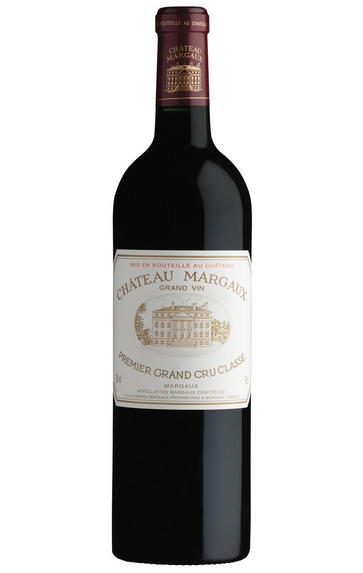
2000 Château Margaux, Margaux, Bordeaux
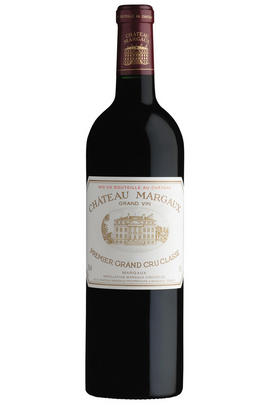
Critics reviews
Tasted at the château.
The 2000 Château Margaux remains one of the standouts of the millennial year. This bottle is consistent with the previous example. It's deep in color. The aromatics are intense and backward, opening with blackberry, crushed violet and pencil box scents with time, but there remains a sense of beguiling aloofness, as if you are so lucky to be in its presence, which you are. The palate has a large structure for this First Growth, yet there is a sense of pliancy with a multi-layered, very persistent, satin-textured finish. Divine.
Drink 2023 - 2075
Neil Martin, Vinous.com (September 2023)
Violet and iris aromatics curling out of the glass, starting to reach their full expression at 20 years old. Beautifully finessed and elegant, with hints of black truffle, cloves and rich blackberry fruits, this is a vintage that showcases the best of Margaux. It took its time to reach this point but it has been worth the wait, and the wine just gets better and better over a few hours in the glass. Highlights the success of the partnership between owner Corinne Mentzelopoulos and director Paul Pontantallier, with this château delivering some of the most memorable wines of the turn of the century years in Bordeaux.
Drink 2020 - 2050
Jane Anson, Decanter.com (July 2020)
Dark ruby with some development and a remarkably similar colour to Lafite 2000. A little raw and unresolved on the nose. A bit scrawnier than some 2000s. Not luscious certainly. Still quite teenage. Long with quite a bit of interest on the finish but it probably needs a bit of time to really come into focus. For the moment it's a bit awkward with very marked tannins.
Drink 2016 - 2030
Jancis Robinson MW, JancisRobinson.com (March 2010)
Tasted blind, the 2000 Chateau Margaux was a reminder of the peaks the millennial vintage could reach. Noticeably deep in colour, the bouquet rivets you to the seat with copious red berry fruit, clove and truffle, with hints of cedar emerging with time. As the aromatics open and aerate, the fruit profile darkens and manifests blackcurrants and bilberries. The palate is medium-bodied with filigree tannin. This First Growth conveys immense depth and symmetry, which is quite masculine for the estate, with a gentle but insistent grip. It is a brilliant wine that flirts with perfection. Afford it another 3-4 years if you can because it will last decades.
Drink 2020 - 2060
Neil Martin, Wine Advocate (February 2017)
Absolutely compelling in two tastings of this vintage, the 2000 Margaux is composed of 90% Cabernet Sauvignon and 10% Merlot. The extraordinary seductiveness, complex aromatics, and purity it exhibits lead me to believe it has reached its window of full maturity. Medium-bodied, with layers of concentration, stunning blue, red, and black fruits intermixed with spring flowers, a subtle dosage of new oak, and a distinctive personality that is elegant while at the same time powerful and substantial, this is a multi-dimensional wine that was extremely approachable and drinkable in both tastings I had of it. The colour remains healthy, even opaque bluish/purple, but there is no reason to hesitate to drink it. It should evolve for another 30-40 years, so there is no hurry.
Drink 2012 - 2050
Robert M. Parker, Jr., Wine Advocate (June 2010)
This thrilling wine from a textbook year is dark in colour and shows pronounced aromas of ripe mulberry and black plum fruit, with hints of spice and smoke – the aromas are youthful, and still show some influence from the cask ageing. The texture is lush and dense, with firmish tannins, a plump feel and a warm, approachable texture. Has the substance to age for decades to come. The results in the glass are in every way a fulfilment of the promise of the millennial year.
Drink 2023 - 2070
Charles Curtis MW, Decanter.com (July 2023)
The 2000 is a blend of 90% Cabernet Sauvignon and 10% Merlot brought up new barrels.
Tasted from magnum, the 2000 Château Margaux is a prodigious, flawless wine that shows the elegance and seductive hallmark of the estate paired with incredible density, depth, and richness. Its still-ruby/purple colour is followed by sensational notes of crème de cassis, spring flowers, lead pencil, and sandalwood that develop beautifully with time in the glass. Medium to full-bodied, opulent, and seamless, with a multi-dimensional, layered texture, it has a massive mid-palate, sweet tannins, and a finish that won’t quit. It’s drinking brilliantly today, and there’s certainly no need to delay gratification, but it’s going to continue evolving for another 3-4 decades. Bordeaux (or red wine, for that matter) doesn’t get any better.
Jeb Dunnuck, JebDunnuck.com (March 2019)
Full ruby-red. Penetrating, highly perfumed aromas of sappy dark berries, violet and minerals; seems less oaky today than the '01. Offers compelling mouth-filling concentration and perfume. A wine of great power and consistency, with a pungent minerality lingering on the palate-staining finish. This somehow doesn't flag or grow narrower even after one swallows or spits. Makes the 2002 seem almost dry in comparison. Wine-of-the-vintage material.
Stephen Tanzer, Vinous.com (May 2003)
About this WINE
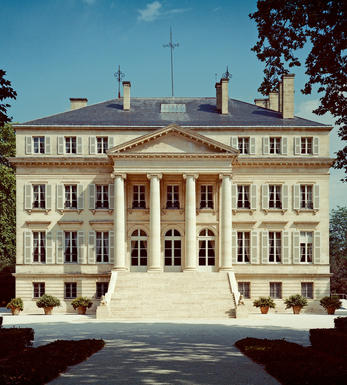
Chateau Margaux
Château Margaux, a First Growth property, has been owned by the Mentzelopoulos family since 1978. It has since consistently produced some of the finest wines in the Médoc.
One of the grandest, most imposing buildings amongst the Médoc châteaux, Ch. Margaux in its current form was built in the early 19th century, although viticulture had been practised on the estate for several centuries before. A chequered period of ownership in the 19th and early 20th century meant that the quality of some vintages was patchy. But the change which restored the property to its rightful status came in 1977 when it was bought by André Mentzenopoulos, Greek by birth but who had lived in France since 1958 and had made a fortune through supermarket retailing. André immediately instigated much-needed investment in vineyard and cellar. His untimely death in 1980 saw his daughter, Corinne, take up the reins. Corinne’s shrewdest move was the recruitment of talented young winemaker Paul Pontallier to oversee the production.
Paul would lead the estate for 33 vintages. He sadly passed away in 2016. Today, the estate is overseen by director Philippe Bascaules and technical director Sebastien Vergne, working with consultant Eric Boissenot.
The estate has 82 hectares under vine, with Cabernet Sauvignon inevitably dominant (75%) with 20% Merlot making up most of the rest, along with a smattering of Cabernet Franc and Petit Verdot. Unusually in Margaux, there is a white wine made here, Pavillon Blanc, from 100% Sauvignon Blanc, while the two red wines are, of course, Ch. Margaux itself and Pavillon Rouge. Typically, about 30,000 cases of red wine are made, with the Grand Vin usually accounting for just over 40% of the total. Production of the white wine amounts to less than 3,000 cases.
Margaux wines are renowned for their perfumed elegance, but this should not be construed as meaning that these are light-bodied. Far from it, as the best have an enviable structure, layers of complexity, and formidable length.
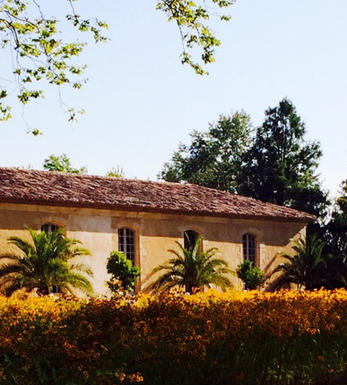
Margaux
If Pauillac can be seen as the bastion of ‘traditional’ Red Bordeaux, then Margaux represents its other facet in producing wines that are among Bordeaux’s most sensual and alluring. It is the largest commune in the Médoc, encompassing the communes of Cantenac, Soussans, Arsac and Labaude, in addition to Margaux itself. Located in the centre of the Haut-Médoc, Margaux is the closest of the important communes to the city of Bordeaux.
The soils in Margaux are the lightest and most gravelly of the Médoc, with some also containing a high percentage of sand. Vineyards located in Cantenac and Margaux make up the core of the appelation with the best vineyard sites being located on well-drained slopes, whose lighter soils give Margaux its deft touch and silky perfumes. Further away from the water, there is a greater clay content and the wines are less dramatically perfumed.
Margaux is the most diffuse of all the Médoc appelations with a reputation for scaling the heights with irreproachable wines such as Ch. Margaux and Ch. Palmer, but also plumbing the depths, with too many other châteaux not fulfilling their potential. There has been an upward shift in recent years, but the appellation cannot yet boast the reliability of St Julien. However, the finest Margaux are exquisitely perfumed and models of refinement and subtlety which have few parallels in Bordeaux.
Recommended Châteaux: Ch. Margaux, Ch. Palmer, Ch. Brane-Cantenac, Ch. Rauzan-Ségla , Ch. Dufort-Vivens, Ch. Ferrière, Ch. du Tertre, Ch. Giscours, Ch. d'Angludet.
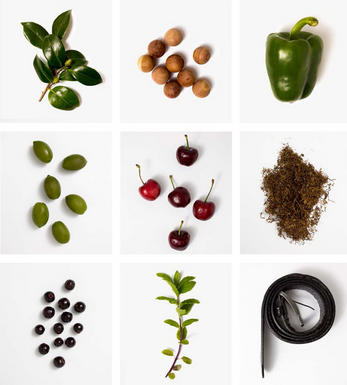
Cabernet Sauvignon Blend
Cabernet Sauvignon lends itself particularly well in blends with Merlot. This is actually the archetypal Bordeaux blend, though in different proportions in the sub-regions and sometimes topped up with Cabernet Franc, Malbec, and Petit Verdot.
In the Médoc and Graves the percentage of Cabernet Sauvignon in the blend can range from 95% (Mouton-Rothschild) to as low as 40%. It is particularly suited to the dry, warm, free- draining, gravel-rich soils and is responsible for the redolent cassis characteristics as well as the depth of colour, tannic structure and pronounced acidity of Médoc wines. However 100% Cabernet Sauvignon wines can be slightly hollow-tasting in the middle palate and Merlot with its generous, fleshy fruit flavours acts as a perfect foil by filling in this cavity.
In St-Emilion and Pomerol, the blends are Merlot dominated as Cabernet Sauvignon can struggle to ripen there - when it is included, it adds structure and body to the wine. Sassicaia is the most famous Bordeaux blend in Italy and has spawned many imitations, whereby the blend is now firmly established in the New World and particularly in California and Australia.


Buying options
Add to wishlist
Description
Tasted at the château.
The 2000 Château Margaux remains one of the standouts of the millennial year. This bottle is consistent with the previous example. It's deep in color. The aromatics are intense and backward, opening with blackberry, crushed violet and pencil box scents with time, but there remains a sense of beguiling aloofness, as if you are so lucky to be in its presence, which you are. The palate has a large structure for this First Growth, yet there is a sense of pliancy with a multi-layered, very persistent, satin-textured finish. Divine.
Drink 2023 - 2075
Neil Martin, Vinous.com (September 2023)
wine at a glance
Delivery and quality guarantee